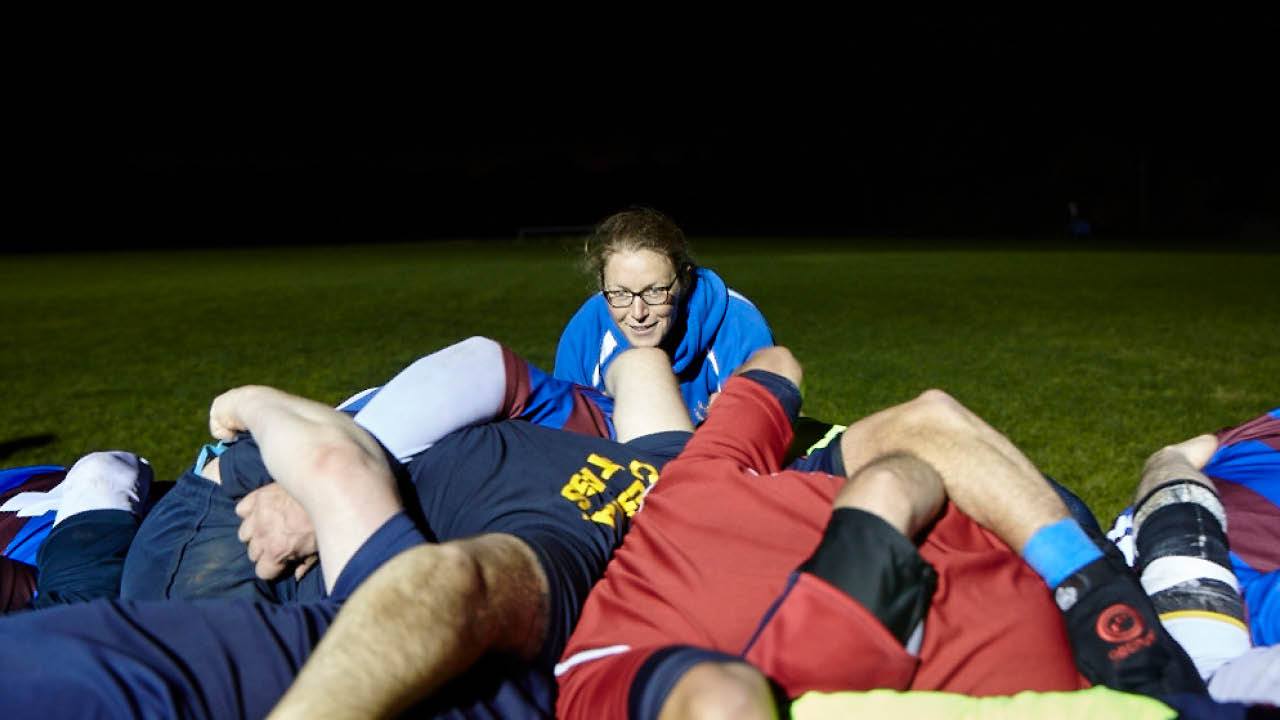The most-capped English player of all-time, Rocky Clark MBE took on coaching with her local men’s side and is now player-coach at Saracens. She talks to Jon Newcombe about her scrum life for rhino.direct

Rocky Clark MBE’s scrum life. With 137 caps, the Saracens prop has more than any other England player, male or female.
Now retired from international rugby, the Rugby World Cup 2014 winner is forwards and skills coach at the Premier 15s club whilst continuing to play despite turning 40 in May.
Clark, MBE, has also recently taken up a position as a full-time member of the coaching team at Bedford Modern School.
How did you end up in the front row?
“I went along to my local rugby club (Beaconsfield RFC in Buckinghamshire) initially because my friend said they were short of numbers and I was like, ‘I don’t want to play as I’ll get injured’. They told me not to be silly and to come along and try it. It so happens I did one session and they said we’re playing next week and you’re in! I sort of learnt how to tackle by the coach saying chase me and then grab my legs, which obviously doesn’t happen now. I got put in at prop. I think the instruction was grab this person around the waist, bend over and push and that’s what I did. They were like, ‘you’re actually pretty good at this’, and I stayed there for many years.”
What is it you like about being a piano pusher rather than a piano player?
“I love the physical, one-on-one battle. I love the fact you have got to work your opponent out. Sometimes they win, sometimes you win, but if you can win the overall war, you’ve had a good day at the office.”
Did your approach to the game change much over time?
“Apart from eating my body weight, I was quite a little lump. I was known as a bit of a beer monster for my first three years at Uni and I was 109 kilos, but then they dangled the carrot that I had to get fit to get capped and I lost 29 kilos and then stayed in the England squad until 2018, from 2003, so not a bad innings.”
Best moment in rugby?
“In international rugby that would obviously that would be winning the World Cup. It was also very enjoyable any time you took the ball off France against the head in the scrum, and silencing the crowd who were all booing you.
In terms of club rugby, it was ironically against Saracens. I was at Henley at the time, we were close to folding (through lack of numbers). We had six props playing in the scrum, Nolli Waterman was our nine and I don’t think we had a sub yet we beat them, 5-0. That was a top, top moment. It’s fair to say we had an alright day in the scrum but not so good in the lineout.”
Worst?
“Losing the World Cup finals in 2006 and 2010 was pretty horrendous to try and deal with. It felt like my entire world was gone in that final whistle, especially in 2010 when we had previously beaten them in the autumn and we really thought we were going to win it on home soil. To lose 13-10 in the final was just a real kick in the teeth. But after a bit of time licking our wounds, processing it and going through what we could have done better, the majority of that team stayed together and we were determined for 2014. We built this pack which was pretty relentless. I called it the monster, and whoever was in the shirt just helped the monster to keep on growing.
From an injury point of view, it would have to be the game against New Zealand when I dislocated my shoulder trying to lift the team up with a big tackle. I tried to play on but couldn’t lift in the lineout or scrummage so I had to come off after 20 minutes.”
How did you get into rugby coaching?
“I did my Level 2 at Uni (Plymouth Marjon) because I was on a coaching degree and I fell into it that way. I enjoyed playing so I wanted to do as much as I could to be in and around rugby and help others grow. I applied for my Level 3, and got it, and I absolutely loved coaching the Chesham lads, from 2010-2019 and the Bucks University men’s lads as well. I love that you can still feel the elation when you win or you see somebody so something amazing, and you have given them the confidence to do that, and also the disappointment when you lose and you shouldn’t.
I think one of the best things about coaching while you are still playing is that it makes you a better player because you understand the game better.”

Most valuable lesson you learnt as a young coach?
“One of the big things is the value of repetition. I took it for granted in the early days that I’ve taught them this and now they’re good at rucking, and I can now move onto the next thing. Little did I know that three weeks later they will have forgotten the certain move or certain play that we’d done a session or two on. Now I try and link everything back together and keep practising, even if it’s a little instalment or touch of what we were doing, just to get the brain cells going again.
Also, at the start at Chesham, it was hard to loosen the reins. But I learnt pretty hard that you need to utilitise other people otherwise you burn out.”
The hardest thing about coaching?
“The best players are the players who have the best attitude. It is hard sometimes when you get a player who might be a little bit negative and you have to have a conversation with them. Selection is the hardest thing, but also when you have selection headaches, that’s the best thing because you want to be picking the right people for the right game. I had to drop a couple of the older guys from the first team (at Chesham), and they’d been in the first team for 10 years, because I wanted to rotate the squad, and they didn’t want to play in the 2s so they hung up their boots.”
Your favourite rugby drill?
“Obviously, I love scrummaging and practising the scrum, doing drills against the scrum machine, the Rhino one with the sled, doing reps for timing and speed across the mark and that kind of thing. I’m also a fan of a conditioning-based games that are relevant to the skill you are doing.”
What qualities does the perfect prop need to have?
“They need to be an excellent scrummager, physical in the ruck to slow down opposition ball, an aggressive and strong carrier particularly in the heavier collision area, and also have soft hands and the ability to pull out a pass to their 10.”
Who are you coaching heroes and mentors?
“Geoff Richards was my first England head coach and picked me when I was a rough diamond so I’ll always be grateful to him for giving me the opportunity. Then, Graham Smith was my coach for almost 100 caps of my England career, so he needs a big hat tip for my development and making me the player I am today.”
Clark’s dream pack
1) Gethin Jenkins
I love his physicality and his ball-handling ability. He was one of the first ‘modern-day’ props but still with a big taste for scrummaging.
2) Amy Garnett
Her work-rate was huge. Gnarly and aggressive and just someone you want on your team
3) Sophie Hemming
Another workhorse. I spent many a year of scrummaging with her as my tight-head. A great scrummager who got around the park really well.
4) Maro Itoje
He’s just amazing. Has all the ball skills, is a big physical unit, is a poacher of the ball is so many ways and a real pain in the bum to play against.
5) Tamara Taylor
Has been around for years and a stalwart of the lineout. A selfless player who makes others look good.
6) Courtney Lawes
Big and aggressive and plays to the edge. I love his work-rate and his tackling and fact he can play six or in the second row.
7) Marlie Packer
She’s just dogged and aggressive and always gets you front-foot ball. Has a never-give-up attitude and gives everything she has got.
She’s a big bruiser and has great vision and isn’t scared to make a mis-pass. I like the fact she gets under peoples’ skin at the ruck and is a real presence on the pitch.

